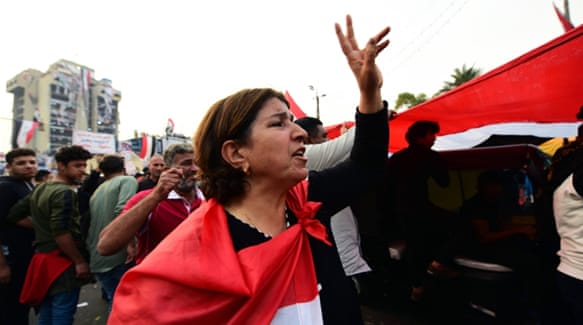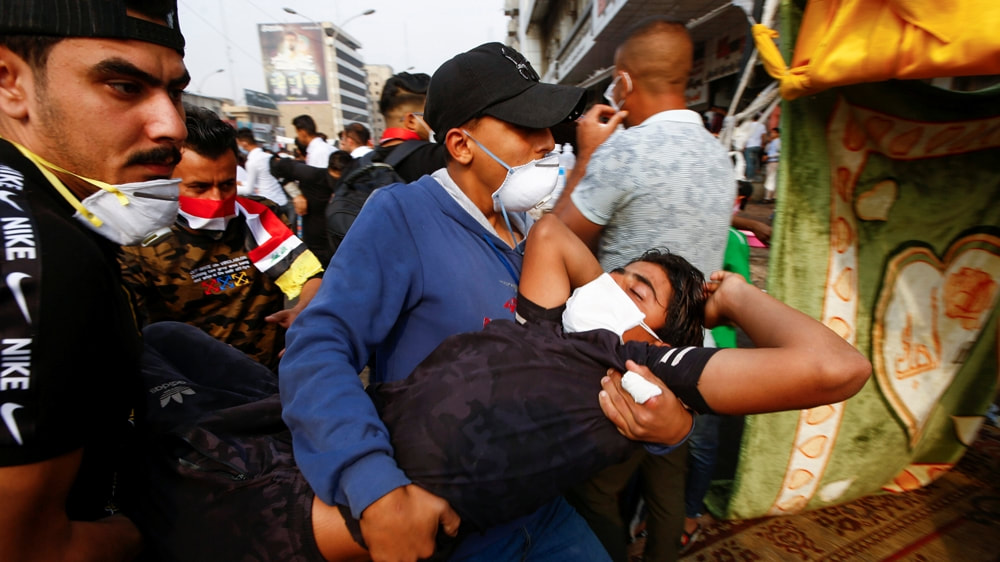Hamza was running for his life the day he was shot in the back by Iraqi security forces while taking part in the country's anti-government protests. Like most afternoons since the start of the second wave of demonstrations on October 25, he took to the streets of Baghdad with thousands of others, to demand the overhaul of the country's political system.
Years of public discontent came to a head in October when demonstrations demanding an end to government corruption, foreign interference in Iraqi affairs, unemployment and a lack of basic facilities sparked Iraq's largest protests in years.
What began as peaceful demonstrations on October 1 have been mired by the killing of more than 430 people and the wounding of 15,000 - including Hamza.
Unlike the previous week, on November 4, the 17-year-old would not walk off Ahrar bridge, where some of the more violent clashes have taken place.
The young student is just one of an estimated 3,000 protesters who have suffered life-altering injuries that have led to paralysis or amputation, according to a local NGO.
Ali al-Bayati of the Iraqi High Commission for Human Rights (IHCHR), told Al Jazeera that both protesters and security forces have suffered this fate.
According to local media reports, Parliament's Human Rights Committee has said that the use of excessive force by security forces - including live ammunition, military-grade tear gas canisters and rubber bullets - has caused one-sided or total paralysis in a large number of demonstrators.
Rights groups have condemned the government for allowing an excessive and "unlawful use of lethal force" against protesters.
Prime Minister Adel Abdul Mahdi last week announced his resignation following an intense day of bloodshed in which 50 people were killed and hundreds of others wounded in a crackdown by security forces in southern Iraq.
"They will feel God's wrath," said Hamza's mother, umm Hamza, in reference to the security forces that wounded her son.
At the time of the interview, the teenager was too weak to speak to Al Jazeera and was readying himself to board a flight to India, where his family hopes he will receive better medical care than in Iraq.
"The pain is unbearable, so we medicate him," said umm Hamza over the phone. A photograph of her son on a hospital bed shows his left leg in a cast and a patchwork of thick stitches crisscrossing down his thoracic cage to below his belly button.
Umm Hamza shared a video of her wounded son's limp body being carried away from a disorderly crowd of protesters and security forces towards the east bank of the Tigris river.
"One martyr, one fallen martyr!" yells the protester behind the lens, unaware that while Hamza's life had changed forever, he would survive the attack.
"His life has been ruined," said umm Hamza, fearing for her son's future in a country where the needs of disabled and chronically ill people are not met or prioritised.
Iraqi society continues to marginalise its disabled citizens, explained Muwafaq al-Khafaji of the non-governmental Iraqi Alliance for Disabilities Organisation (IADO). "They have difficulties accessing services due to poor mobility facilities ... and insufficient financial help," he said.
According to Iraq's Committee on the Rights of Persons with Disabilities the country of almost 40 million has one of the largest populations of persons with disabilities in the world. IADO puts the figure at approximately four million.
Detention Fears
After years of crises, Iraq's overburdened public health system is struggling to provide adequate care for its patients. Many wounded protesters choose not to go to government-run hospitals for fear of being arrested, instead, they receive first aid from volunteer medics on the scene but refuse more thorough check-ups.
Worried about the possibility of being detained, protester Abu Hassan declined to be transferred to a public hospital. Instead, he sought medical advice from a friend and doctor, who concluded that the 47-year-old likely suffered a mini-stroke when violent clashes broke out around him on November 15.
I need air, was the last thing Abu Hassan recalls saying as three tear gas canisters landed at his feet, shrouding him in white smoke and causing him to lose consciousness and tumble to the ground near Khilani Square.
Less than an hour after the incident, he awoke inside a medical tent in Tahrir Square, surrounded by protesters and volunteer doctors. "I tried to stand but I couldn't feel my left leg," he said, sitting at a cafe in Baghdad's Al Mansour neighbourhood, weeks after the incident.
Abu Hassan's doctor says he cannot predict whether his patient will make a full recovery. But almost two weeks after the attack, Abu Hassan continued to struggle to speak and use his left hand.
"I have to focus to form words. The sound doesn't come out as I want," he said slowly. A chronic migraine on the left side of his head has also become a source of concern for the father-of-two.
"My personal life has suffered," he explained quietly, his voice catching in his throat.
Simple day-to-day routines have become a challenge. His son has been tasked with waiting outside the door when his father uses the toilet, in case he falls over. The stroke also caused Abu Hassan erectile dysfunction, unsettling his relationship with his wife.
"My tongue feels heavy, I can't speak well, and my left leg and arm don't work well," he explained, listing just some of the life-altering consequences faced by protesters who have been wounded in clashes.
While the wide-scale protests have been largely peaceful, violence has escalated recently in the country's south, where demonstrators in Najaf torched the Iranian consulate twice in a week in a display of anger about Iranian influence in Iraqi affairs, and also sought to gain entry to the Hakim holy shrine.
Security forces have responded with live ammunition to disperse the crowds. At least 18 people were shot dead in Najaf after the consulate was first attacked.
Collective Patriotism
On the day he was wounded, Hamza had draped the Iraqi flag over his shoulders, in a sign of national unity.
Unlike the sectarian discourse that has often characterised violence in Iraq, this uprising has been largely rooted in a generation's collective patriotism and their anger towards the ruling elite. He and his friends were on that bridge to demand a better life, explained the boy's mother.
"I don't want what happened to him to be in vain," said umm Hamza, as she prepared to fly to India with her son, in hope that someday he might recover from his crippling injury and lead a better a life.
Source



 RSS Feed
RSS Feed